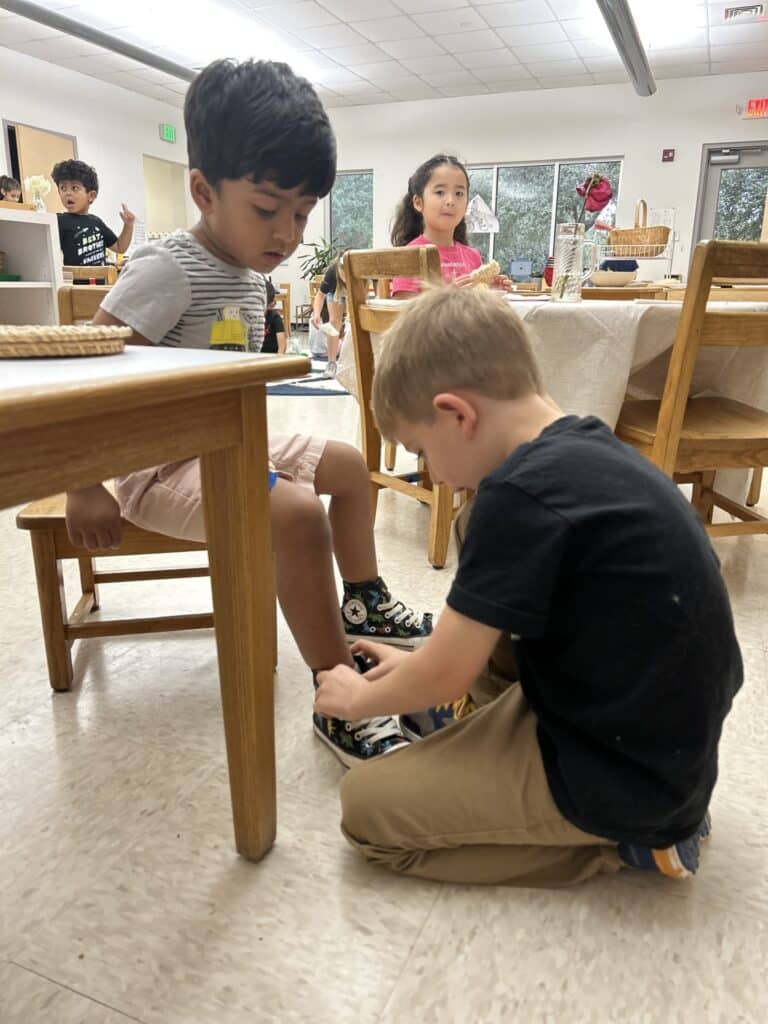by Emily Lund
I recently came across a book titled The Mister Rogers Effect and having fond memories of watching Mister Rogers as a child, I decided to check it out. What I found is that Mister Rogers’ calm demeanor, kind words and affirmations, and daily invitations to be his neighbor reflect what I see every day in our Montessori environment. This phenomenon, labeled as the “Mister Rogers Effect,” rooted in empathy and kindness, aligns seamlessly with Montessori principles and, in doing so, provides a pathway toward embracing diversity, equity, and inclusion (DEI) in education. The professional development session last Wednesday further reaffirmed this connection as we discussed what belonging looks like at MSSA.
At its core, the Mister Rogers Effect revolves around unconditional regard and empathy, mirroring the principles of Montessori education. This union of ideals not only prioritizes the emotional well-being of children, but also lays the groundwork for fostering inclusion by acknowledging and respecting the unique experiences and backgrounds of each child. The Mister Rogers Effect, like Montessori education, underscores the importance of nurturing emotional intelligence. By recognizing and validating emotions, children are empowered to develop a profound understanding of themselves and others, creating a foundation for fostering inclusivity and empathy in the broader community.
Mister Rogers’ encouragement of curiosity and self-directed exploration also aligns with the Montessori philosophy of allowing children to independently navigate their educational journey. By recognizing and celebrating diverse interests, talents, and perspectives, this approach forms the basis for an inclusive environment where every child feels valued and acknowledged.
Both Mister Rogers’ Neighborhood and Montessori classrooms prioritize creating environments that are not only welcoming, but also reflective of diversity. The intentional design of spaces considers the diverse backgrounds and experiences of the children, fostering a sense of belonging and acceptance. As with MSSA, Mister Rogers welcomed people of all races, religions, and backgrounds into his neighborhood promoting diversity and belonging. At the time, such representation was rare in mainstream media.
The Montessori philosophy along with Mister Rogers Effect form a powerful foundation that nurtures the hearts and minds of children while fostering a sense of unity, respect, and appreciation for the rich tapestry of backgrounds and experiences that make each child unique. In embracing both frameworks, we create learning environments that celebrate diversity and empower children to become compassionate, inclusive, and empathetic contributors to society.
We spent the day last Wednesday making connections with one another. We defined diversity, equity, and inclusion, and discussed what that looks like at MSSA. DEI at MSSA looks like waiting to serve dinner at the gala after sundown out of respect for those observing Ramadan, providing appropriate scissors for a left-handed student, recognizing that we all have different lived experiences, making sure that no one is alone on the playground, and offering the same warm welcome to everyone who comes in the door. In grade levels and as a community we will continue to discuss areas we can improve so that everyone at MSSA feels a sense of belonging and students are in the best place for optimal learning and growth.

